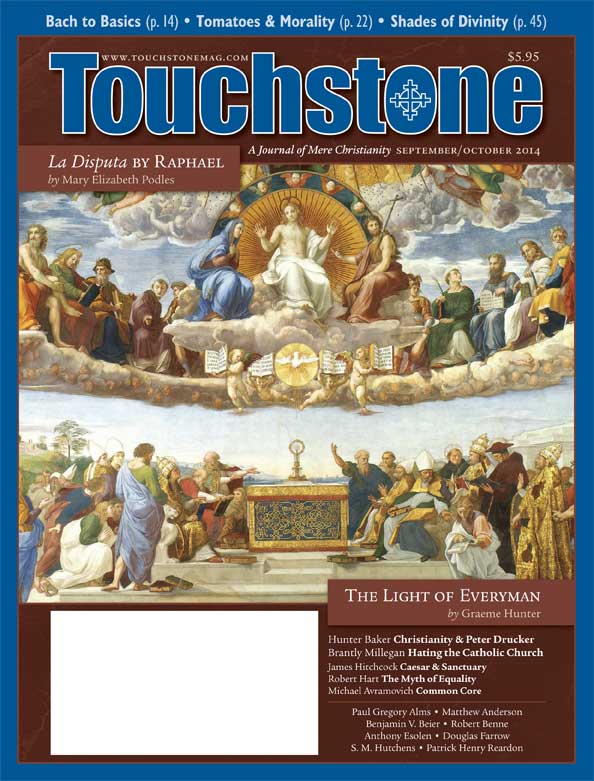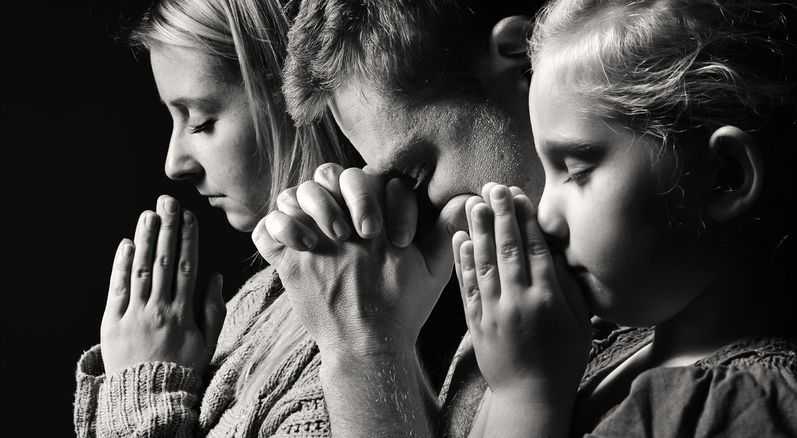Reviews
No Offense Taken
What Is Marriage? Man and Woman: A Defense
by Sherif Girgis, Ryan T. Anderson,
and Robert P. George
Encounter Books, 2012
(146 pages, $15.99, paperback)
reviewed by Douglas Farrow
Same-sex marriage is at once a very stupid idea, as this book makes clear, and a very wicked one, which it does not. Whether the deliberate omission is to the book's credit is a question to which we will return. It suffices for now to observe that What Is Marriage? (which doesn't, as I recall, deploy the word stupid) represents a model contribution to public discourse, combining clarity and pithiness with fairness and generosity. Read it; then give it to anyone who shows even the slightest interest in a civilized discussion of the topic.
The main argument is easy to summarize. There are two views of marriage vying for supremacy, viz., the traditional or conjugal view and the revisionist or romantic view. According to the former, marriage is the comprehensive union of a man and a woman that is by nature (though not always in fact) oriented to procreation and child-rearing. According to the latter, marriage is an emotional union, enhanced by sexual activity according to preference, taking the form of a publicly recognized domestic partnership.
According to the authors, only the former can make sense of marriage as a public institution contributing to the common good, and of the laws that have traditionally governed marriage. Insofar as the latter prevails (as it must if there is to be same-sex marriage), marriage is misunderstood and its objective norms, particularly exclusivity and permanence, are obscured or otherwise threatened, along with the cultural goods formerly cultivated by marriage, including those that justify the state's involvement with the institution. These goods concern, among other things, the personal fulfillment proper to marriage, spousal well-being, child well-being, friendship, religious liberty, and limited government. Helpful remarks are made on each, though there is much more to be said than the book's brevity permits.

Homosexuality Bracketed
This book—original in its configuration rather than in its thesis, and perhaps the best of a rare breed—tries to show "that conjugal marriage laws are indeed rationally grounded" (p. 6). It succinctly addresses many of the leading objections to the traditional view of marriage while exposing the incoherence of the revisionist view. To read it against the backdrop of the Benthamite charge leveled afresh by the Supreme Court majority in Windsor—that defense of the conjugal view of marriage is rooted not in reason but merely in animus towards homosexuals—is to marvel at the Court's capacity for intellectual dishonesty. The defense is, or can be, eminently rational, as it is here, while the failure to make such a defense leaves society exposed to real and present dangers.
For their part, Girgis, Anderson, and George are careful to bracket out homosexuality. In their opening sentence (and periodically throughout the book) they assert that the so-called "gay marriage debate is not directly about homosexuality, but about marriage"; that is, "not about whom to let marry, but about what marriage is." This is more or less right. Anyone, in principle, may marry if he chooses, whichever sort of thing marriage is. But what is he doing if he marries, and is it anything the rest of us should care about? Is it something of public rather than merely private import? What Is Marriage? makes it abundantly evident that the traditionalists have a much easier time with such questions than the revisionists. Moreover, the competition between their respective views of marriage, as the authors note, is rooted in disagreements pre-dating proposals for same-sex marriage—disagreements about divorce, for example.
Just here, however, a caveat or two. Efforts to redefine marriage at law are bound up with the rise of the homosexualist movement as a natural extension of the contraceptive mentality that underlies the divorce culture. One can appreciate the authors' reticence about this movement and this mentality; not to bracket it would at the very least require a different rhetorical strategy. Certainly it is easier to say, "We're not attacking what anyone feels or does; we're only defending the institution of marriage," than to say, "Some forms of sexual behavior, if widely approved and practiced, must inevitably destroy the institution of marriage and civilization with it."
The Sustained Assault on Marriage
The authors do insist that changing the definition of marriage will destroy it, with deep collateral damage to society, leaning for support on the testimony of revisionists who make no effort to disguise their intention to destroy it. But is it enough to consider only the proximate goal? Or would it be prudent to take account of the ultimate goal, which is to normalize homosexual behavior and, with it, virtually any form of sterile sex? At all events, it seems rather odd to claim that "the same-sex civil marriage debate is not about anyone's private behavior, but [only] about legal recognition" (p. 90).
The strategy adopted by the authors doubtless makes it more difficult for their opponents to wield the "Bigot!" weapon, and correspondingly easier for their readers to stop and ponder the question as to what marriage is. Yet many opponents (high court justices included) level the charge of bigotry just the same, and for this reason: they know full well that the conjugal view of marriage militates against the normalization both of homosexual acts and (as the authors remind us, albeit only in support of their claim that the debate is not about homosexuality or the morality thereof) of certain heterosexual acts. So why avoid any of this? Why not engage the opposition on the ground they actually hold most dear?
Certainly it is not for lack of courage or for lack of insight. These authors exemplify both. They know, and have stated plainly, not only that the revisionist view of marriage is so thin that it cannot but collapse when it has destroyed the traditional view, but that what it will then have accomplished is the destruction of traditional morality and of any place in society for communities clinging to that morality. They know, too, that their notion of a comprehensive union, at once both spiritual and bodily, is under sustained assault from contemporary, neo-gnostic hatred of the body (a point they almost make in the Appendix). No one needs to tell them that there's a war going on here; they are in the thick of it.
A Huxleyan Development
The explanation lies in their determination to restrict themselves to philosophy, and to restrict their philosophy in such a way as to isolate it from controversy about right and wrong; in short, to make significant concessions to secularism's suspension of moral judgment. It can be argued, however, that this suspension itself is but a feint on the field of battle and should rather be exposed as such. How, in any case, are we to reconcile the claim that marriages are "moral realities" (p. 80) with the bracketing of basic questions about the morality of non-coital sexual acts (p. 10)? And should we admit that "the human good of marriage and its bearing on the common good can be understood, analyzed, and discussed without engaging anyone's theology"? (p. 95).
They are more astute when they say that there is "no neutral marriage policy"—which is just as true morally and theologically as it is philosophically or politically. Hence one does well to have to hand other writings from these authors that don't attempt such a bracketing, together with sustained works on sexuality and marriage that are happily both philosophical and theological, such as Alexander Pruss's One Body (Notre Dame, 2013).
Their insistence on monogamy supplies a case in point—surely it owes more to Scripture than to philosophy—but we may pass that by to mention another matter, one that goes to the heart of the argument the authors make about marriage as "a human good with a fixed core that we are equally wise to recognize and unable to reshape" (p. 52). Do Girgis, Anderson, and George attend sufficiently to the fact that the separation of sex from procreation works both ways? That sex without procreation has as its counterpart procreation without sex, and that procreation without sex is what we are now capable of?
This Huxleyan development makes more plausible a skeptical response to talk of "something morally distinctive, even awe-inspiring, and crucial for marriage," viz., the coital act seen precisely as that which "unites generation to generation as one blood, and man to woman as one flesh" (p. 109; cf. the note at 102). In other words, the ground in human history and in human nature to which the authors appeal, and on which they rest their case philosophically, is today fiercely contested with the help of new high-tech weaponry. It seems we are able to reshape reproduction, so why not the institution of marriage that once governed reproduction?
More That Needs Saying
It is tempting to ask whether their Finnis-like approach to natural law and their eschewal of public theology will not land them in some difficulty as they attempt to formulate a reply, but we can't pursue that here. What we can do is query the omission noted above. Same-sex marriage really is a stupid idea, but it is not the idea of the stupid. Otherwise put: it is not accidentally stupid, but decidedly perverse. On my view, it is not uncivilized to say so; indeed, respect for civilization requires us to say so.
It is a very useful thing to explain to pagans (and re-paganized Christians) the coherence of marriage and the incoherence of same-sex marriage. It is a necessary thing to explain to them also the wickedness of the proposal for same-sex marriage. May we look, then, for a sequel, lending "in dreadful darknesse" (as Spenser says) also this "desiréd light"? •
Douglas Farrow is Professor of Theology and Ethics at McGill University in Montreal. His recent books include Ascension Theology, Desiring a Better Country, Theological Negotiations, and 1 & 2 Thessalonians in the Brazos Theological Commentary on the Bible. He is a senior editor of Touchstone.
subscription options
Order
Print/Online Subscription

Get six issues (one year) of Touchstone PLUS full online access including pdf downloads for only $39.95. That's only $3.34 per month!
Order
Online Only
Subscription

Get a one-year full-access subscription to the Touchstone online archives for only $19.95. That's only $1.66 per month!
bulk subscriptions
Order Touchstone subscriptions in bulk and save $10 per sub! Each subscription includes 6 issues of Touchstone plus full online access to touchstonemag.com—including archives, videos, and pdf downloads of recent issues for only $29.95 each! Great for churches or study groups.
Transactions will be processed on a secure server.
more on marriage from the online archives
more from the online archives
calling all readers
Please Donate
"There are magazines worth reading but few worth saving . . . Touchstone is just such a magazine."
—Alice von Hildebrand
"Here we do not concede one square millimeter of territory to falsehood, folly, contemporary sentimentality, or fashion. We speak the truth, and let God be our judge. . . . Touchstone is the one committedly Christian conservative journal."
—Anthony Esolen, Touchstone senior editor













